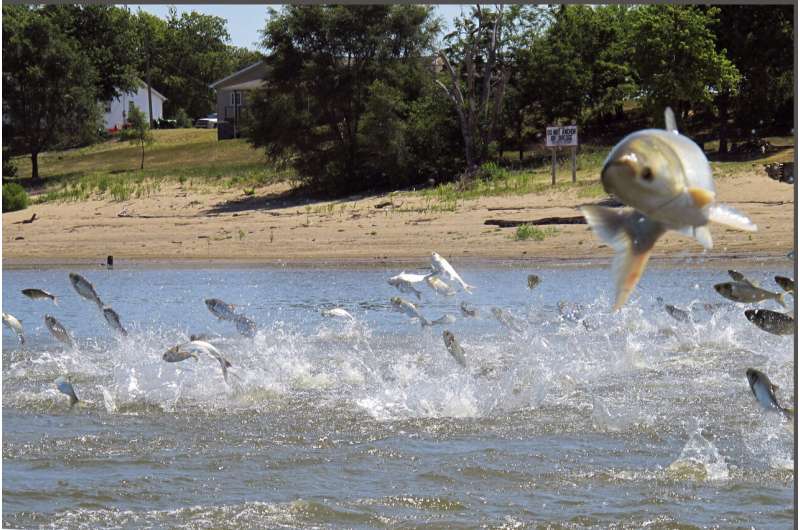Study links Asian carp with Mississippi River fish drop

Sport fish have declined significantly in portions of the Upper Mississippi River infested with Asian carp, adding evidence to fears about the invader's threat to native species, according to a new study.
Analysis of nearly 20 years of population data suggests the carp are out-competing fish prized by anglers, such as yellow perch, bluegill, and black and white crappie, the report said.
Scientists have long suspected Asian carp of starving out other fish in the Mississippi and many of its tributaries. The peer-reviewed study this month in the journal Biological Invasions is among the first to establish a solid link, lead author John Chick said in an interview Friday.
"The alarms have been out there for a long time now," said Chick, a fisheries biologist who directs a University of Illinois field station in Alton, Illinois. "This adds further mustard to the argument that we need to be taking these things seriously. The trends that have been established here are not the trends we want to see in other places."
Four varieties of Asian carp were imported in the late 1960s and early 1970s to clear algae and weeds from sewage ponds and fish farms. They escaped into the Mississippi and have migrated northward.
Bighead and silver carp are the most troublesome. They gorge on tiny animals and plants known as plankton, which virtually all fish eat as juveniles. For some filter-feeding species, it's a lifelong staple.
Federal and state agencies have spent heavily on research and technology to keep them out of key waterways.
In their paper, Chick and colleagues there's rarely enough data to document how invasive species harm natives.
But the U.S. Army Corps of Engineers has been monitoring fish in the Upper Mississippi system for more than two decades, including several years before the carp arrived, using electrofishing to collect samples.
Analyzing Corps numbers compiled between 1994 and 2013, Chick's team found sport fish dropped about 30 percent in two carp-infested areas on the Mississippi River and one on the Illinois River.
Meanwhile, sport fish numbers grew nearly 35 percent in three sections of the Mississippi farther upstream that the carp hadn't reached.
The trends have continued, said Chick, who still monitors Corps data.
The study focused on silver carp, notorious for leaping from the water when startled, because they're more abundant in the Upper Mississippi than bighead carp.
It found that sport fish probably are losing out during early life stages, when they're dependent on plankton the carp are gobbling up.
The researchers considered other factors including flooding, water temperatures and sediment pollution. But none was found to have played a significant role in the sport fish trends in the upper Mississippi.
The region has drawn less attention in the carp battle than the Great Lakes, researchers said, but its outdoor recreation economy is valued at about $2.2 billion.
The study is valuable because it's based on direct observation of fish populations over an extended period, said Tammy Newcomb, a fisheries biologist and Asian carp expert with the Michigan Department of Natural Resources.
"It's another piece of science that contributes to the overall sense of urgency" to stop the carps' advance, said Newcomb, who was not part of the study.
Kevin Irons, aquatic nuisance species manager with the Illinois Department of Natural Resources, who also didn't take part in the study, said he generally agreed with its findings.
But he said it didn't prove invasive carp had caused the sport fish drop-offs and that differences between river sections such as vegetation also can affect fish numbers.
Journal information: Biological Invasions
© 2019 The Associated Press. All rights reserved.














